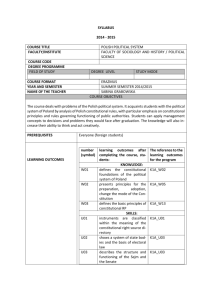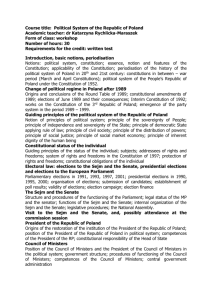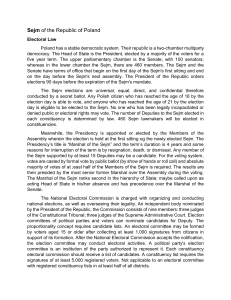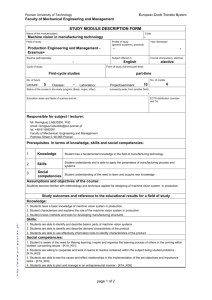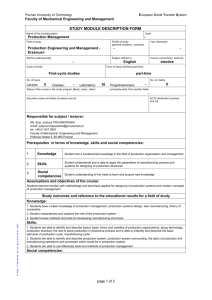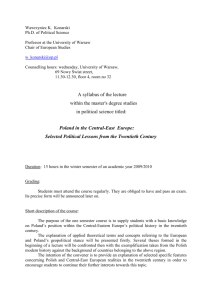SYLLABUS 2014 - 2015 COURSE TITLE POLISH POLITICAL
advertisement
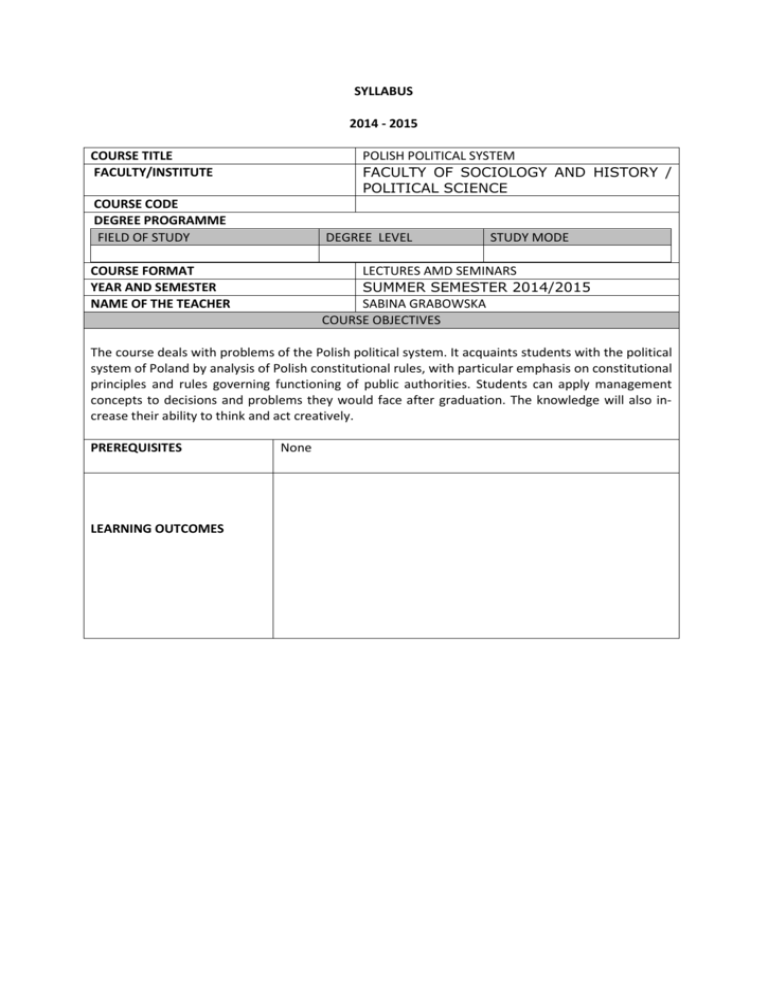
SYLLABUS 2014 - 2015 COURSE TITLE FACULTY/INSTITUTE POLISH POLITICAL SYSTEM FACULTY OF SOCIOLOGY AND HISTORY / POLITICAL SCIENCE COURSE CODE DEGREE PROGRAMME FIELD OF STUDY DEGREE LEVEL COURSE FORMAT YEAR AND SEMESTER NAME OF THE TEACHER STUDY MODE LECTURES AMD SEMINARS SUMMER SEMESTER 2014/2015 SABINA GRABOWSKA COURSE OBJECTIVES The course deals with problems of the Polish political system. It acquaints students with the political system of Poland by analysis of Polish constitutional rules, with particular emphasis on constitutional principles and rules governing functioning of public authorities. Students can apply management concepts to decisions and problems they would face after graduation. The knowledge will also increase their ability to think and act creatively. PREREQUISITES LEARNING OUTCOMES None number (symbol) W01 W02 W03 U01 U02 U03 U04 K01 K02 K03 learning outcomes after The reference to completing the course, stu- the learning outdents: comes for the program KNOWLEDGE: defines the constitutional K1A_W02 foundations of the political system of Poland presents principles for the K1A_W05 preparation, adoption, change the mode of the Constitution defines the basic principles of K1A_W13 constitutional RP SKILLS: instruments are classified K1A_U01 within the meaning of the constitutional right source directory shows a system of state bod- K1A_U03 ies and the basis of electoral law describes the structure and K1A_U03 functioning of the Sejm and the Senate explains the structure and K1A_U01 powers of the executive branch in Poland FINAL COURSE OUTPUT - SOCIAL COMPETENCES recognizes the multi-level K1A_K02 structure and division of responsibilities within the local government in Poland discusses the importance of K1A_K06 supervisory authorities and law enforcement accepts the job and knows K1A_K06 the structure of the judiciary in Poland COURSE ORGANISATION –LEARNING FORMAT AND NUMBER OF HOURS Oral and written examination with internal examiner. The examiner can ask elaborating and supplementary questions. Each week 2 hours for 15 weeks (one semester) COURSE DESCRIPTION Brief history of Polish Parliamentarism and Constitutionalism. Sources of the Polish Constitutional Law. Principles of the Constitutional System. Relations between the individual and the state. Legislative power. 2 h. 3 h. 4 h. 4 h. 4 h. Executive power. Judicial power. Bodies of the state supervision and protection of law. Decentralization – territorial self – government. Significance of the national constitutional law and comparative constitutional law. METHODS OF INSTRUCTION REQUIREMENTS AND ASSESSMENTS GRADING SYSTEM 3 h. 3 h. 2 h. 3 h. 2 h. Multimedia lecture presentation, video projection, discussion, analysis and interpretation of the source texts, projects, presentations, case studies, group work, class participation - PREPARATION AND PARTICIPATION IN SEMINARS (1-5 p.) PRESENTATIONS (1-5 p.) - FINAL PAPER (1-5 p.) 14-15 POINTS – VERY GOOD (5.0) 12-13 POINTS – GOOD PLUS (4.5) 11 POINTS – GOOD (4.0) 9-10 POINTS – SATISFACTORY PLUS (3.5) 8 POINTS – SATISFACTORY (3.0) LESS THAN 8 POINTS – UNSATISFACTORY (2.0) numer (symbol) How to verify and evaluate the effect of education KNOWLEDGE W01 - Test results first completion; - Assessment of response during the oral exam. W02 - Test results first completion; - Assessment of response during the oral exam. W03 - Assessment of student expression during exercise; - The effects of the student in the group during the exercise; - Assessment of response during the oral exam. SKILLS: U01 - Assessment of student expression during exercise (delivered in this paper); - Participation and the effects of the student group; - Observation of the student's work during exercise; - Assessment of student attitudes during the interview exam. U02 - Assessment of student expression during exercise (delivered in this paper); - Participation and the effects of the student group; - Observation of the student's work during exercise; - Assessment of student attitudes during the interview exam. U03 - Assessment of student expression during exercise (delivered in this paper); - Participation and the effects of the student group; - Observation of the student's work during exercise; - Assessment of student attitudes during the interview exam. U04 - Assessment of student expression during exercise (delivered in this paper); - Participation and the effects of the student group; - Observation of the student's work during exercise; - Assessment of student attitudes during the interview exam. FINAL COURSE OUTPUT - SOCIAL COMPETENCES K01 - Assessment of student expression and posture during exercise; - Assessment of student participation in discussions during lectures and exercises. K02 - Participation and the effects of the student group; - Assessment of student expression and posture during exercise. K03 - Participation and the effects of the student group; - Assessment of student expression and posture during exercise. TOTAL STUDENT WORKLOAD NEEDED TO ACHIEVE EXPECTED LEARNING OUTCOMES EXPRESSED IN TIME AND ECTS CREDIT POINTS Activity Lecture Exercises Number of hours / student workload 15 h 15 h preparation for exercise 15 h part in the consultation 3h time to prepare written work 10 h time to prepare a presentation 10 h exam preparation 15 h participation in the exam 1h TOTAL HOURS 81 h Number of ECTS credits 4 ECTS Number of ECTS credits in courses that require direct participation of teachers and students 2 The number of ECTS credits in courses of practical 0 LANGUAGE OF INSTRUCTION INTERNSHIP MATERIALS ENGLISH -----PRIMARY OR REQUIRED BOOKS/READINGS: Banaszak B., Human Rights and the Rights of Citizens in the New Constitution of the Republic of Poland, “The Sejm Review”, 2002 Banaszak B., Outline of Polish Constitutional Law, Wrocław 2005, Garlicki L., Control Powers of the Senate of the Republic of Poland? Remarks to the Article by Prof. Paweł Sarnecki, “The Sejm Review”, 2002 Garlicki L., The Constitution — the Rules of Procedure of the Sejm — Statutes, “The Sejm Review”, 2002 Sarnecki P., Control Powers of the Senate of the Republic of Poland, “The Sejm Review”, 2002 Zubik M., On the Necessity of the Implementation of New By-Laws for the Sejm, “The Sejm Review”, 2002 SUPPLEMENTAL OR OPTIONAL BOOKS/READINGS: Koksanowicz G., The Constitutional Position of the Marshal of the Sejm in Light of the Constitution of April 2, 1997, “The Sejm Review”, 2002 Kubas S., Presidial Bodies of the Sejm in Light of the Constitution of the Republic of Poland and the Amendments of the Sejm By-Laws during the Years 1997–2000, “The Sejm Review”, 2002 Kudej M., Changes in the Rules of Procedure of the Sejm in the Light of the New Constitution of the Republic of Poland, “The Sejm Review”, 2002 Lis-Staranowicz D., Incompatibility with Regard to a Parliamentary Mandate under the Constitution of the Republic of Poland of 2 April 1997, “The Sejm Review”, 2002 Patyra S., The Constructive Vote of No Confidence as a Formula for the Creation and Dismissal of the Council of Ministers, “The Sejm Review”, 2002
